It’s that time of the year, folks: that time when we subject the Oscar acceptance speeches to a level of statistical scrutiny they definitely don’t deserve. Ladies and Gentlemen, the 3rd Annual OTI Oscar Acceptance Speech Word Cloud:
Since the 2010 ceremony, I’ve aggregated the text of all the speeches, generated a word cloud like the one you see above, and performed some rudimentary statistical analysis on things like the average number of words per speech. This year, though, I’m kicking things up a notch with Excel charts and graphs that show how these numbers have changed over the last three ceremonies. Because that’s the only way I can remain interested in this annual self-congratulatory snooze-fest of an awards show.
But I digress. On to the graphs!
Word Per Speech
After a significant increase in wordiness on a per-speech basis from 2010 to 2011, the wordiness of the speeches has dropped below that of 2010.
| 2010 | 2011 | 2012 | |
| Words | 3534 | 4231 | 3223 |
| Speeches | 24 | 23 | 23 |
| Words-to-Speech Ratio | 147.25 | 183.96 | 140.13 |
(Note: these numbers differ from what was used in previous editions of this analysis. I’ve switched to a more reliable text analyzing tool and normalized the results using that instead of going back to the old numbers.)
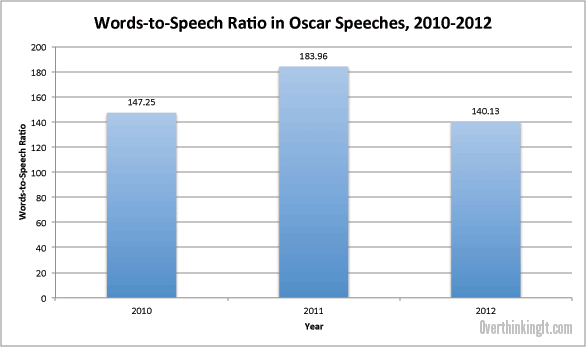
Although given how many Oscars The Artist took home, I expected that number to be much lower.
Silent movie joke!
“Thank”s Per Speech
As with 2010 and 2011, “thank” was the by far the most commonly used word. In 2012, we see a clear indicator that the trend of thanking in Oscar speeches is increasing.
| 2010 | 2011 | 2012 | |
| Occurences of “thank” | 91 | 91 | 117 |
| Speeches | 24 | 23 | 23 |
| “Thank”-to-Speech Ratio | 3.79 | 3.96 | 5.09 |
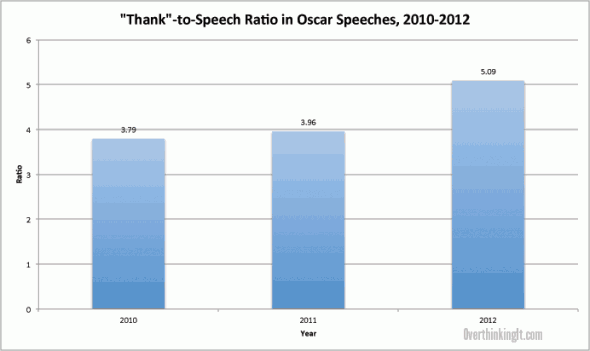
At this rate, by the year 2030, Oscar speeches will solely consist of the word “thank” repeated over and over again. I, for one, thankfully and fully embrace this future trend of thankiness, and I thankfully expect Overthinking It articles to gradually increase their use of the word “thank” going forward to match this trend. (Note to self: purchase domain OverthankingIt.com and squat on it until it becomes SOLID GOLD.)
I’d like to thank the Academy…
The Academy is one of the most common targets of thanks, not surprising given that they’re both the selectors of the winners as well as the winners’ colleagues.
| 2010 | 2011 | 2012 | |
| Occurences of “academy” | 13 | 7 | 21 |
| Speeches | 24 | 23 | 23 |
| “Academy”-to-Speech Ratio | 0.54 | 0.30 | 0.91 |
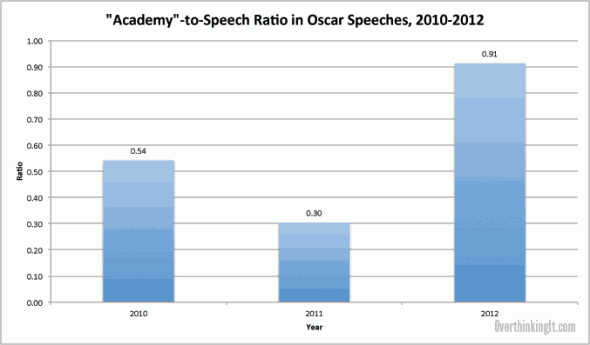
But what could explain this recent spike in giving thanks to the Academy? Is it a Scientology thing? Did Scientologists recently increase their numbers in the ranks of the Academy and among Oscar winners, and this is their way of secretly acknowledging their new religious bonds? It must be a Scientology thing.
Oh. My. God.
Whatever the reason for increased thanks to the Academy, God remains insanely jealous. For each of the last 3 ceremonies, The Great Producer in the Sky was only mentioned 3 times, typically in the form of “Oh my God,” and never thanked. Not once.
| 2010 | 2011 | 2012 | |
| Mentions of “God” | 3 | 3 | 3 |
| Thanks to “God” | 0 | 0 | 0 |
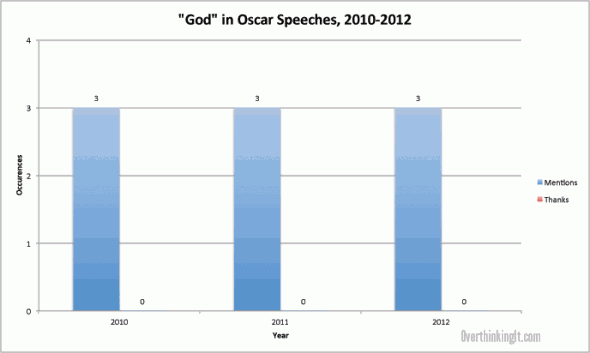
God shouldn’t feel so bad. Fellow Hollywood diety James Cameron didn’t get thanked this year either.
Take my wife. No, I mean, I thank my wife!
No surprise here: as was the case in previous years, wives get (almost) all the shout outs.
| 2010 | 2011 | 2012 | |
| Wife | 6 | 12 | 11 |
| Husband | 2 | 0 | 1 |
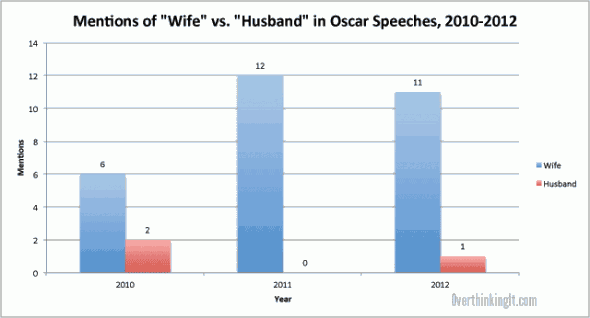
My sources tell me it’s not because women are so much better than men at supporting a spouse in the film industry and are therefore more deserving of thanks; it’s because most of the winners are straight men who happen to have wives, regardless of how much they deserve it.
Now there’s a graph I’d like to see: spousal support levels for Hollywood bigshots.
Movies vs. Films
| 2010 | 2011 | 2012 | |
| Film + Films | 24 | 27 | 14 |
| Movie + Movies | 11 | 12 | 23 |
Putting snark aside for this last entry: I was actually surprised by the sudden turn towards “movie” or “movies” instead of “film” or “films” as the preferred way to refer to motion pictures, given the Academy’s continuing habit of taking a high-brow approach to nominations that prefers “films” like The Tree of Life instead of “movies” like Bridesmaids.
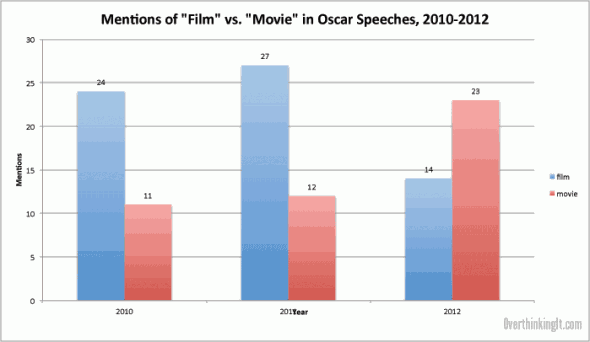
I can’t come up with a serious explanation for this change, but I can remind us of the reality of the distinction between “film” and “movie” in our culture. According to Google Trends, searches for “movie” outpace searches for “film” by a huge margin in the United States:

But, interestingly, that margin is slightly smaller in cultural capitals New York and California, where high-brow types are more likely to reside:
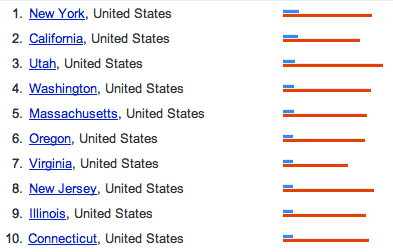
Any theories as to why Oscar winners were so much more likely to refer to “movies” instead of “films” this year? Is there any chance a Tim Tebow will come to Hollywood and thank the crap out of God at next year’s ceremony? Is there a correlation between the GDP of Greece and any of these indicators? If so, let me know your crackpot, or not-so-crackpot theories in the comments!
Updated 2012-02-29: stripped-down text of the speeches (without speaker identifiers) is available here if you want to do your own analysis. Also, mistake in count of “husband” in 2011 was corrected.
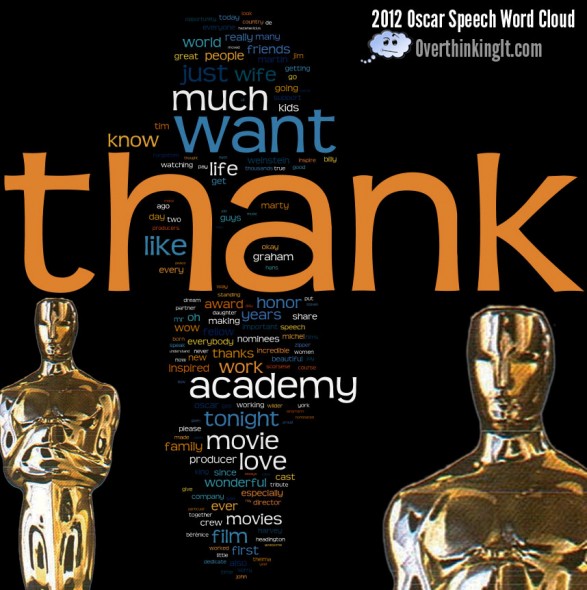
A bad year for British films would adequately account for the Movie/Film ratio change. “Movie” is not normal usage in Britain.
That was my first thought as well. Over the weekend I’ll put together a “Brits at oscars vs. mentions of film” graph and see if it kicks anything interesting.
I’m pretty sure Meryl Streep mentioned his husband, though I can’t remember what word she used. Also I think ‘partner’ was used instead of wife/husband but can obviously mean work partner.
My impression was this year’s show was meant to be a little less fru-fru and more relatable with the “lets go to movies” theme. Hence calling the motion pictures “movies”.
Movie only really means motion picture, but ‘movies’ and ‘movie theatre’ are two of the most common terms for venues where they’re watched. The other main one is cinema.
Film can refer to the motion picture, or to the stuff you put into a camera to record it on, or the act of recording it. Also, generally, to a thin layer of something.
While film has a much broader range of meanings, people on the internet are mostly trying to look up where and when they can go see a motion picture.
Any stats on the mentioning of parents?
No thanks to the parents! What ungrateful children! Producer/producers got 9 mentions though. I guess in a way, producers are the parents of Hollywood movies.
I’d be curious about that, too… I can recall at least two parental mentions (Bret McKenzie thanking his parents for not telling him to get a real job, and some other guy thanking his mother “like Javier Bardem did”)…
I wouldn’t mind knowing what the most common “non-cliche” words would be. There might not be enough of a pattern for words that are not directly Academy-related, and I’d imaigne most would correspond to the film nominees themselves, but I’m still curious.
Upon closer analysis: “parents” got 1 mention. “Mother”/”mom” got 3, and “dad” got 1 mention. “Grandfather” did get 1 shout-out.
Quoting Mark:
“The Academy is one of the most common targets of thanks, not surprising given that they’re both the selectors of the winners as well as the winners’ colleagues.”
“Winners’ Colleagues” is probably the gentlest way of saying “losers” that I’ve ever read. Which is to say, it’s a phrase FULL OF NOT LOSE.
FULL OF NOT LOSE feels like the kind phrasing I’m expected to use on lab reports. That is, the lack of losing can be verified but it doesn’t not necessarily mean that one is winning.
I noticed the onslaught of Academy thanks as well. I got the impression that Octavia Spencer set the tone on that one. As the first winner of the night, she thanked the Academy at the beginning of her speech – literally the first thing the audience heard from a winner. It felt a bit like the other nominees in the audience were like “oh, right” and scribbled a last-minute addition to their prepared remarks. I bet if we had enough data, we would see that the earlier the first mention of the Academy is, the more hits it gets overall (i.e., it isn’t random).
Toni is right – Meryl Streep started her speech by thanking her husband and even made some crack about doing it early rather than later in her speech.
Agree with Neubauer that the theme of the night was “We Love Movies,” which probably led to the higher use of the term, though Anomaly UK’s point is very interesting. The Brits cleaned up last year with The King’s Speech. That could have kept the word “film” hanging in the air.
I’m waiting for the year that Ireland and Northern Ireland sweep the board (The Guard would have been in my best film shortlist) and Filum becomes the No. 1 word.
@ Toni @ Sparks
Thanks for catching the “husband” mistake. Chart and graph have been updated with the correction.
Also, I posted the text file with the transcripts if anyone is interested in doing their own analysis.
How many times did Harvey Weinstein get mentioned?